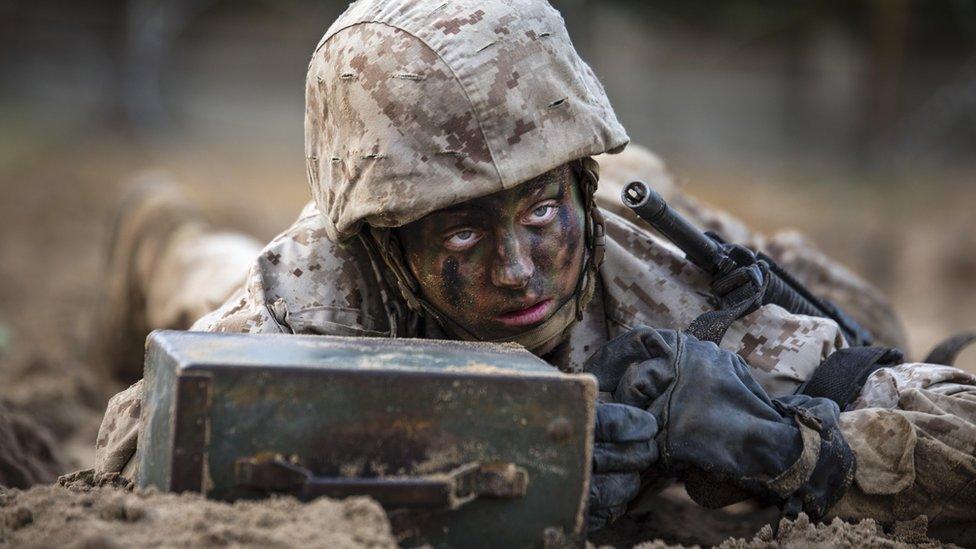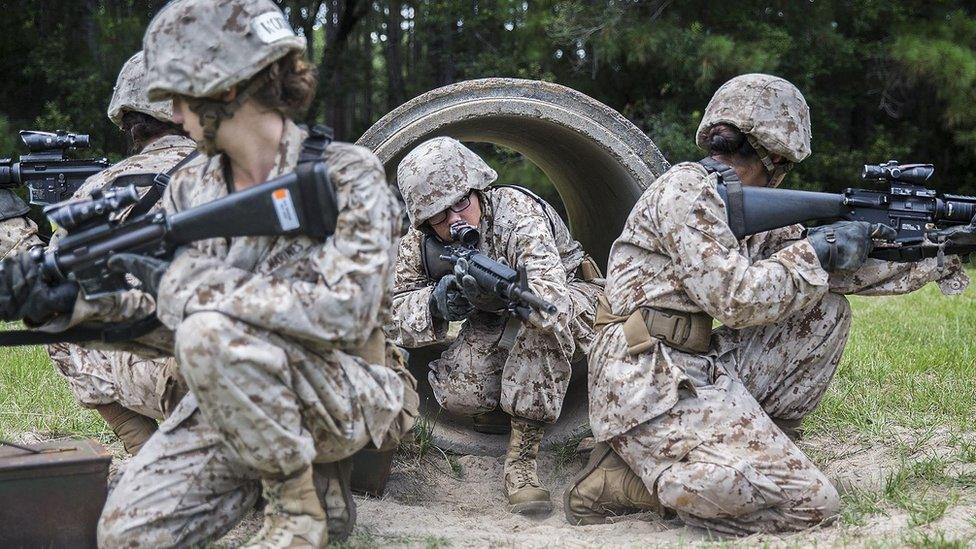The women taking a gruelling test to be US Marines
- Published

The US Marines have a particular mystique - often first into a hotspot, and last out - and the training recruits undergo is particularly challenging. This applies to female marines - now for the first time being used in combat roles - as well as their male counterparts. Hannah King, of the British Forces Broadcasting Service, witnessed some of them undergoing an intense, 54-hour trial known as the Crucible.
"Hit 'er, Davey, harder… Hit her harder."
The khaki camo-paint caking the drill instructor's face hides her crimson rage as she screeches in at a small recruit, who obediently hammers away at her opponent's head with her fists.
This is one of the final events of the Crucible - a gruelling 54-hour endurance test that will ultimately determine which of these young women will become US Marines.
Parris Island, hidden from the Atlantic by a tangle of sparkling rivers, looks like the perfect holiday spot. But this is where all female marines come to be trained. Or "reprogrammed", as some prefer to say. And it's far from serene.
For three months now they've been screamed at by merciless Alsatian-like instructors and exercised to exhaustion. They've been stripped of their purses, their phones, their feelings, their personalities.
From the moment they arrive on Parris Island they can no longer say "I". From now on, it's "this recruit". "This recruit requests..." "This recruit believes…"
They will say everything in unison, and move everywhere in perfect formation. The sticky South Carolina air is filled with their ditties as they chant the instructions for every single task - from loading their guns to filing in to take a shower.
The US Marine Corps has accepted women into its ranks since 1918, although then only for clerical duties. Over the next century, however, their contribution would increase significantly.
By 1985 they had their first female brigadier-general and just a few weeks ago the first three female marines took up roles in a ground combat unit, ready to fight on the front line - something which is yet to happen on our side of the pond.

"I don't mean to sound contentious," I begin apologetically, suddenly acutely aware of my classic Britishness, "but what do you think of your female counterparts? Do they make good marines?"
The young male drill instructor starting before me barely hesitates: "What it comes down to, ma'am, is this. Mission accomplishment. If there's a mortarman three clicks away who's gonna give you support - you're not gonna care. If you get shot and blown up and a helicopter comes in to pull you out - you're not gonna care about the race, creed, colour or sex of that marine."
He has a point.
In a gigantic swimming pool on the other side of camp, some fresh new recruits are doing their swim assessment. One test requires them to remove all clothes, guns and ammunition underwater, in less than 10 seconds.
It sounds like a tall order. But as I look around the pool, some of them are only just learning to swim. "Why would you want to become a marine," I wonder, "if you can't even swim…"
It dawns on me that recruits here perhaps join for different reasons to those back in the UK. Firstly, serving four years here means all your future tuition fees and some living costs are paid. It's almost a free ticket to university.
Secondly, many of these wannabe marines really do believe that serving your country is just something everyone should do. Once you've served - then you can go on to become the lawyer, the teacher, or the hairdresser that you've always dreamed of being. But first - you serve your country.
And the Marines are the best of the best. It's where everyone wants to be.
The gift shop on Parris Island offers tourist tat to rival any popular attraction. T-shirts and tracksuits, car stickers, key fobs and coffee cups - declaring proudly "Marine Wife," "Proud Marine Dad," and even "My granddaughter's a Marine".

Find out more
From Our Own Correspondent has insight and analysis from BBC journalists, correspondents and writers from around the world
Listen on iPlayer, get the podcast or listen on the BBC World Service or on Radio 4 on Thursdays at 11:00 BST and Saturdays at 11:30 BST

In one corner, miniscule baseball caps and bears are emblazoned "Future Marine". The cars packed with loud relatives queueing at the gates are bedecked with banners and paint declaring "Parris Island bound, to collect our new marine," or "Honk for Marine Katy".
"I used to wear my faded jeans, now I'm rockin' cammie greens." A faint chorus echoes across the island, calling out to camp - the newest marines are nearing the end of the torturous Crucible.
Sleep-deprived, hungry, battered and blistered, they still find the breath to sing as they trudge through the gates, beneath a large sign that hollers "We make marines". Fellow servicemen line the road, whooping them in with genuine applause, pride and delight.
On the parade square, they gather. Their ordeal - over.
Normally I might scour a line-up of troops - searching somewhere for a hint of emotion. But there's no problem here.
Tears drizzle down the face of each and every warrior - no matter their gender.
They're the first marines to be sworn in under a brand new commander-in-chief - Donald Trump. Some of them will probably go on to be amongst the first women to serve on the front line. There may be interesting times ahead.

Join the conversation - find us on Facebook, external, Instagram, external, Snapchat , externaland Twitter, external.